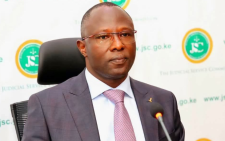Gachagua wants strict law on illicit brew

Deputy President, Rigathi Gachagua has urged Members of the County Assemblies (MCAs) to establish laws with heavy penalties for producers of illicit brews.
Gachagua said Assemblies have agreed to give priority to the laws and ensure they are in place by June.
He made the remarks as he called for a multi-agency approach to end the menace of illicit brew and substance abuse, saying that the first responsibility is to save the productive age from this problem.
“I do not think any of you is happy to find drunken people lying on the road on your way home…As DP when I go home I am embarrassed, I cannot even get 10 people to work on my farm and have to import workers. All my neighbours’ children are lost and we ask ourselves what kind of country we are leading, and we have said it is not possible anymore,” said Gachagua.
He made the remarks during a consultative meeting to tackle alcoholism at the Kenya School of Government (KSG).
Stiff penalties
“We have asked MCAs to consider putting very strong penalties that are a deterrent, especially on the producers and wholesalers of drugs and alcohol. We have told them to put very stringent fines and imprisonment terms for people found to have manufactured illicit alcohol,” he said.
Key among the measures the DP said should be considered, is shutting down premises found to have been involved in illicit brew business for good.
According to Gachagua, the menace is a serious national problem and everyone has a responsibility to save the next generation not just as officers of Government but also as parent and responsible members of the society.
“We have equally requested for stringent penalties for those who consume and have asked MCAs to look at laws on how vehicles that transport chang’aa and other illicit brews will be forfeited,” uttered Gachagua.
“Parents are in tears. I can hardly go to the village because of the cry of our women because they have lost their children so the assemblies will do their bit and by June 30 we will have laws in the five counties and good laws,” he added.
Found breaking law
He challenged prosecutors, investigating agencies and the police to work together and prosecute those found breaking the law in matters of drugs and illicit brews.
“I request the prosecutors to work closely with our officers and guide them. They should consider training our officers to explain what they need to do for a successful prosecution. Let us not meet in court where the prosecutors say what is brought does not meet the threshold and the officers are not even aware. Let us have a multi-agency approach,” said Gachagua.
He urged the Office of Director of Public Prosecutions (ODPP) to save an already bad situation and much as it is an independent institution, it should not work in isolation. “Much as the ODPP is independent, that independence can only go so far. You depend on other arms of government for resources to run your offices. If we lose the entire productive age group, our economy will collapse and there will be no resources to fund your activities. You cannot work in isolation, all these agencies are interdependent, there is somewhere we have a convergence,” Gachagua said.
This meeting was held against increased consumption of illicit alcohol and substance abuse in the five counties of former Central Kenya Province.
Alcohol abuse
According to the National Authority for the Campaign Against Alcohol and Drug Abuse (NACADA), alcohol abuse in Central Kenya is a major problem due to high levels of consumption, ease of availability, affordability and accessibility.
This ranged from 51.5 percent in Nyandarua to 75.4 percent in Kirinyaga.
A perception assessment by the authority indicates that more than 80% of people feel second-generation alcohol consumption is on the rise.
While counties have licensed outlets to sell legitimate alcohol, some have been distributing illicit brews. In the five counties, there are 12,953 bars, bars and restaurants, and wines and spirits outlets.
The meeting culminated in the adoption of a communique, which gives a framework of collaboration between and among the various government agencies in dealing with the menace.










